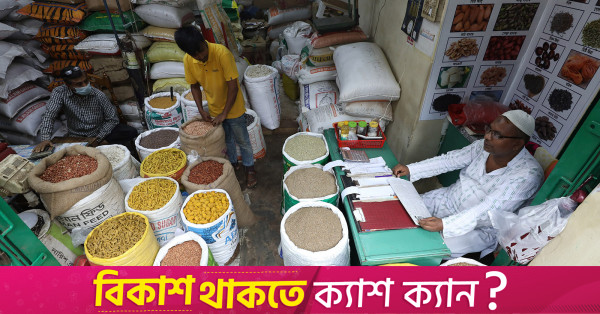Illegal DO trade: Khatunganj cardamom businessman disappears with Tk50 crore advance payments


File Photo: Chattogram’s Khatunganj is the country’s largest wholesale market for consumer goods. Photo: Mohammad Minhaj Uddin/TBS
“>
File Photo: Chattogram’s Khatunganj is the country’s largest wholesale market for consumer goods. Photo: Mohammad Minhaj Uddin/TBS
A businessman in Khatunganj — the country’s largest market for wholesale essential commodities — has disappeared after mishandling around Tk50 crore in advance payments against delivery orders (DOs) or slip trading from numerous cardamom traders.
The accused, Nazim Uddin, owner of Noor Trading, allegedly exploited the DO trading system to manipulate cardamom trade in the market, confirmed Chittagong Chamber of Commerce and Industry (CCCI) Director Alamgir Parvez.
The incident, however, is not unprecedented in Khatunganj as the market has a notorious reputation for illegal slip or DO trading, a share market-like mechanism with a profit-making orientation.
Despite operating in a legal grey area and creating obscure market hype, this illicit profiteering often leads to skyrocketing commodity prices.
According to several Khatunganj traders, Nazim Uddin had been trading various consumer goods, including edible oil and sugar, within Sonamiya Market, a hub known for illegal DO or slip trade.
Nazim recently expanded his operations to include cardamom DO business.
It is alleged that after selling cardamom DOs to multiple businessmen and collecting the payment, Nazim switched off his mobile phone last Wednesday (5 June), leaving his creditors without their goods or refunds.
He had reportedly sold cardamom DOs worth at least Tk5 crore that day alone.
Additionally, he failed to settle debts with traders from whom he had purchased products or DOs a few days prior.
On the evening of the same day, the aggrieved businessmen confronted Nazim and brought him to the office of the Khatunganj Trade and Industries Association. Approximately 40-50 creditors lodged complaints about their unpaid dues with the association’s leaders.
In an attempt to resolve the issue, Nazim was detained overnight at the association’s office. The following day, Nazim’s brother-in-law secured his release by issuing a cheque worth Tk10 crore to the association.
CCCI Director Alamgir Parvez said, “About 40-50 businessmen came to the association’s office last Wednesday with the accused businessman to settle an issue involving Tk 50 crore stuck in the Sonamiya Market cardamom trade. We formed a committee to investigate the claims, and the accused, Nazim Uddin, was released in the custody of his brother-in-law.”
One of the victims, Abdul Mannan of Tanisha Enterprise, said, “Last Tuesday, I bought a DO for 11 tons of cardamom from Noor Enterprise. However, Nazim did not deliver the cardamom or provide a valid cheque. His fraudulent activities came to light when the cheques issued to other traders bounced. We even took him to the association’s office. Yet he managed to disappear after the association released him on condition.”
Nazim’s disappearance has affected several other traders, including Kofil Uddin of SK Traders, who are owed Tk8.5 crore for 20 tons of cardamom; Kamal Uddin of Deen Company, who is owed Tk84 lakh; Meher Store’s Md Ali, who is owed Tk80 lakh; and AM Traders’ Liton, who is owed Tk1 crore.
Nazim owes approximately Tk50 crore to about 40-50 businessmen.
The country’s annual demand for cardamom is estimated to be less than 8,000 tonnes. Yet Chattogram’s Khatunganj witnesses daily trades of over a thousand tonnes of the spice through a speculative practice known as DO trading, which makes the market unstable and causes consumers to suffer.
DO trading involves buying and selling contracts for future cardamom delivery without taking possession of the spice. Traders profit from short-term price fluctuations, often manipulating the market by buying and selling large volumes of contracts.
This speculative trading can lead to significant price volatility in the cardamom market, causing uncertainty for both consumers and businesses.
Some traders gamble on delivery slips during the process, even at inflated prices. Their bet hinges on the belief that demand for these slips will remain high, allowing them to resell at a profit.
However, if their assumptions falter, they face significant losses.
Nazim has been accused of covering up the consumer goods market by not paying the traders the dues of about Tk 50 crore. Traders said that this fraud occurred in the opportunity of delivery order-deo trade, which has been going on for a long time with the spice product cardamom.
The price of cardamom has become unstable in Khathunganj due to the increase in DO trades over the last two months.
Currently, cardamom is being sold at Tk3,900 per kg, although its import cost ranges between Tk1,200 and 1,500.
Reportedly, between 1986 and 2019, at least 68 traders defaulted on their payments to market creditors, collectively taking around Tk900-1000 crore.




